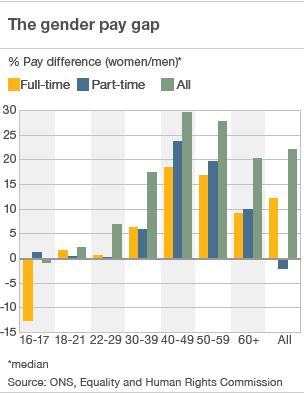Gender pay gap progress 'grinding to a halt'
- Published
Trevor Phillips: "I think it has got stuck because woman are taking one path and men are taking another"
Attempts to close the pay gap between men and women appears to be "grinding to a halt", the Equality and Human Rights Commission has said.
Its wide-ranging 700-page report, external said women on average earned 16% less than men, widening to 27% for women aged 40.
It also found schoolgirls of all ethnic backgrounds outperformed boys, with Chinese girls the top group at 16.
Commission chairman Trevor Phillips said today's Britain was more tolerant but inequality threatened to divide it.
The study entitled How fair is Britain? draws on a range of data and surveys and is the first in a series of reports to be produced for Parliament every three years.
It describes today's Britain as more tolerant of diversity and much less tolerant of discrimination against women, different races and sexual orientation than in past years.
It said there was less opposition today to working for an ethnic minority boss or to inter-ethnic marriages, while stereotypical views of women and men's roles in the family and society had moved on.
However, the report highlighted concern that racial and religious prejudice were increasing.
It said the British public were broadly positive about the economic contribution of immigrants.
While three-quarters said they were concerned about the scale of immigration at a national level, about the same proportion felt immigration was not a problem for their own communities.
The report also warned that the ageing population was creating new kinds of "chronic disadvantage", as many middle-aged couples struggle to look after two generations - their parents and teenage children. A quarter of women in their 50s are carers.
When it came to pay, the report said the gap between men and women was lowest for those under the age of 30, rising more than five-fold by the time workers reached 40, with a "pernicious earnings penalty" affecting some ethnic minority and disabled people.
Women with no qualifications faced a 58% loss in earnings over their lifetime if they had children, said the commission.
Disabled men earned 11% less than other male workers, while the gap was 22% for women.
Black graduates faced a pay penalty of up to 24%, the study suggested.
Total household wealth of the top 10% in society was almost 100 times higher than for the poorest 10%, while one in five people lived in a household with less than 60% of average income.

The report also suggested men and women from the highest social class could expect to live for up to seven years longer than those from lower socio-economic groups. Black Caribbean and Pakistani babies were twice as likely to die in the first year of life as Bangladeshi and white babies.
The report also said conviction rates for rape were "stubbornly low", that obesity was on the rise, and that two-thirds of gay, lesbian and transsexual secondary school students said they had been bullied.
Mr Phillips said: "This review holds up the mirror to fairness in Britain. It is the most complete picture of its kind ever compiled.
"It shows that we are a people who have moved light years in our attitudes to all kinds of human difference, and in our desire to be a truly fair society, but that we are still a country where our achievements haven't yet caught up with our aspirations."
He said that 21st Century Britain faced "the danger of a society divided by the barriers of inequality and injustice".
"For some, the gateways to opportunity appear permanently closed, no matter how hard they try; whilst others seem to have been issued with an 'access all areas' pass at birth," he added.
He warned that recession, demographic change and new technology "all threaten to deepen the fault lines between insiders and outsiders".